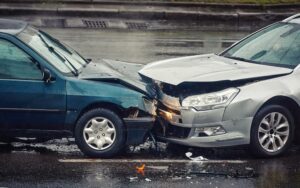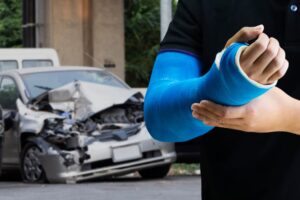Head-on collisions are serious crashes. These types of traffic accidents can cause severe injuries and even death. After a head-on collision, you might find yourself with substantial legal bills and no money coming in. You need an attorney to help get your life back on track.
With an accident attorney’s help, you can access the fair compensation you deserve after a head-on collision. Contact a car accident lawyer today if you have suffered an injury or lost a loved one in a head-on collision.
What Is a Head-On Collision?
A head-on collision is a serious auto accident that often leaves victims with significant injuries. Head-on collisions, sometimes called “frontal crashes,” happen when the front end of one vehicle collides with the front end of another vehicle.
These kinds of traffic crashes can lead to severe injuries or death. The negligent driver is responsible for paying for the other driver and passenger’s injuries. An accident attorney can help discover who is at fault for causing the accident.
How Common Are Head-On Collisions?
 There are not many head-on collisions yearly, but these accidents are deadlier than other crashes. Over the past decade, head-on collisions have only made up around 14 percent of all crash types nationwide.
There are not many head-on collisions yearly, but these accidents are deadlier than other crashes. Over the past decade, head-on collisions have only made up around 14 percent of all crash types nationwide.
Head-on collisions are potentially deadly crashes. If you suffered an injury or lost a loved one in a head-on traffic accident, you deserve compensation. Contact an experienced accident attorney to discuss your legal rights and options after a head-on collision.
How Is Fault Determined In a Head-On Collision?
Determining faults after a head-on collision can be difficult. A traffic accident attorney can help you determine fault through the help of expert witnesses like accident reconstructionists and engineers.
Ultimately, the plaintiff must prove their case for negligence. A negligence claim has four elements- duty, breach, causation, and damage. If any element is not proven, then the claim fails. An attorney can help prove each of the following elements of your head-on collision claim.
Duty
Every driver has a duty to other drivers to drive with reasonable care. “Reasonable care” means driving to avoid traffic accidents. This duty applies the entire time that the driver is on the road.
Breach
A breach of the duty of care happens when the driver operates their vehicle unsafely. A breach of the duty of care can cause a severe accident.
Causation
You and your attorney must connect the accident with your injuries. Causation might be the most challenging element of negligence to prove. A car accident lawyer can help prove that the other driver caused the accident and, therefore, your injuries.
Damages
Every plaintiff must prove that the accident caused them some kind of loss. Damages are usually easy to prove, but discuss your losses with an attorney to ensure you are compensated for the full extent of your accident-related damages.
Common Causes of Head-On Collisions
A head-on collision can happen for many reasons. The cause of the accident typically stems from negligence. Here are some of the most common reasons that head-on collisions happen.
Mechanical Failures
Drivers are required to keep their vehicles in working condition to avoid injury. Mechanical issues, like bad brakes, can lead to severe accidents. Drivers should take all the precautions available to keep other travelers safe.
Failure to Obey Traffic Laws
All drivers must know and follow traffic rules. Failure to follow traffic rules, like running a stop sign or a red light, can easily cause a head-on collision.
Improper Lane Changes
Drivers should stay in the proper lane. Failure to do so can lead to a severe traffic accident.
Fatigued Driving
Driving while sleepy is as dangerous as driving under the influence of drugs or alcohol. The National Highway Traffic Safety Administration reported that 1.8 percent of all fatal crashes from 2017 to 2021 involved a drowsy driver.
Driving Under the Influence of Drugs or Alcohol
Driving while under the influence of drugs or alcohol puts everyone on the road at risk for injury or death. Impaired driving is negligent. An impaired driver might face civil and criminal liability for their actions.
Speeding
Speeding is a common reason that traffic accidents happen nationwide. Speeding drivers can easily lose control of their vehicles and cause a head-on collision. The National Highway Traffic Safety Administration reported that in 2022, 12,151 people were killed in a traffic accident with a speeding driver.
Distracted Driving
Distracted driving can cause a head-on collision. It happens when a driver takes their attention off the road. Even a momentary distraction can cause a head-on collision.
Reckless Driving
Reckless driving includes any unsafe action the driver takes while behind the wheel. Reckless driving can cause two cars to collide.
Common Injuries After Head-On Collisions
Every traffic accident is unique and will bring with it its own set of challenges. Head-on collisions, however, are severe accidents, and certain injuries can be expected. Examples of common injuries from head-on collisions include:
- Airbag injuries

- Amputation
- Burns
- Broken bones, bruises, and lacerations
- Internal organ damage
- Double impact injuries
- Concussions and traumatic brain injury
- Spinal cord injuries
- Psychological trauma
- Death
No matter the type or extent of your injury, you deserve fair compensation. Contact an attorney to protect your right to recover monetary compensation after a head-on collision.
What Damages Are Available After a Head-On Collision
The availability of compensable damages depends on the facts surrounding your accident. There are three general categories of damages: economic, non-economic, and sometimes punitive. Each category is explained in more detail below.
Economic Damages
Economic damages include the easily identifiable physical losses that accident victims suffer. Working with an attorney is the best way to get the compensation you deserve after suffering economic losses from a head-on collision.
Examples of economic damages include:
- Medical expenses
- Lost income
- Childcare costs
- Household expenses
- Property damage
- Transportation costs
- Loss of benefits
- Vocational rehabilitation
- Miscellaneous out-of-pocket expenses
Non-economic Damages
Non-economic losses include intangible losses that the victim suffers after an accident. These losses might be hard for individuals to prove. Having an attorney is the best way to ensure you identify all of your damages and collect compensation for them.
Examples of non-economic damages include:
- Stress on relationships
- Mental anguish
- Loss of independence
- Loss of reputation
- Disability or impairment
- Loss of consortium
- Loss of enjoyment of life
- Emotional distress
- Pain and suffering
Punitive Damages
Punitive damages are not intended to compensate the victim for their losses. Courts typically award punitive damages to punish the defendant for extremely outrageous behavior. Speak with your attorney to determine the availability of punitive damages in your jurisdiction.
Contact an attorney now to discuss your accident-related losses. Talking to a personal injury lawyer about the specifics of your case can lead you toward the full and fair financial compensation you deserve after an accident.
How Can a Head-On Collision Attorney Help Me?
Having an attorney is an invaluable resource for legal guidance and support after a head-on collision. A head-on collision attorney can provide assistance if you have been involved in a head-on car accident. Here are several ways that an attorney can help:
Guidance and Support
A lawyer can help navigate the legal process. A good attorney can provide you with guidance throughout the legal process, helping you understand your rights and options.
Stress Reduction
Your lawyer can help manage the stress of the claims process. A lawyer will handle your case, including all paperwork, allowing you to focus on recovery without the stress of managing legal matters.
Expert Testimony
A lawyer can connect you with other professionals to strengthen your case. They can bring expert witnesses, such as accident reconstruction specialists or medical professionals, to help build your case.
Litigation
Your attorney can file a lawsuit if your case does not settle during negotiations. Your attorney can file a lawsuit and represent you in court, advocating for your rights.
Calculating Damages
An attorney can help calculate your damages after a head-on collision. A lawyer can help calculate economic and non-economic losses, including medical expenses, lost income, pain and suffering, and property damage, among other losses.
Negotiating With Insurance Companies
Your attorney can handle your insurance claim. An attorney can deal with the insurance adjusters on your behalf to negotiate a fair settlement, ensuring you are not under-compensated for your injuries and damages.
Investigation
Your attorney can help gather evidence during an investigation. Attorneys can collect essential evidence, such as police reports, witness statements, photographs of the accident scene, and medical records, to support your claim.
Case Evaluation
An attorney can help by assessing the specifics of your situation. After a review of the facts, an attorney can evaluate the circumstances of the accident, including liability and potential compensation, to determine if you have a viable claim.
Legal Experience
The laws applicable to your case can be quite complex. An attorney can help you handle the complexities of traffic laws and personal injury regulations specific to your jurisdiction.
An attorney can help improve your odds of getting compensation after a head-on collision. If you suffered an injury or a loved one was killed in a head-on collision, contact a personal injury lawyer immediately.
Unique Issues In Head-On Collision Cases
Like any other type of accident case, head-on collisions bring their own set of legal issues. Some key considerations in head-on collisions include:
Expert Analysis
Proving your case might require expert analysis. For example, your case might include complex medical records. An attorney might hire a medical expert to analyze this evidence properly.
Liability Determination
Determining the at-fault party might be challenging after a head-on collision. Work with an attorney to learn how the evidence can prove the validity of your claim.
Severity of Injuries
Head-on collisions can cause severe injuries. Head-on collisions often result in more severe injuries due to the direct nature of the impact. The hit can complicate a medical evaluation and the patient’s long-term prognosis assessments.
Vehicle Damage
The extent of vehicle damage is typically significant in head-on collisions, which can influence claims for property damage and the costs of repairs or replacement.
Witness Testimonies
Eyewitness testimony’s availability or unavailability might complicate a head-on collision case. Working with an attorney might make accessing witness testimony easier.
Emotional and Psychological Impact
Head-on collisions are scary. The thought of a car coming straight toward you can leave you with significant emotional harm. An attorney can help you prove your case for emotional damage.
Potential for Multiple Defendants
Multiple drivers or pedestrians might share liability for a head-on collision. You might have a hard time finding each potential defendant. Working with an attorney can ease this burden.
Insurance Coverage Issues
Just as there are multiple potential defendants, there can be multiple insurance companies that you might work with. Having a legal team can help you navigate the process of handling multiple insurance companies.
Head-On Collisions and Wrongful Death Claims
 The risk of death is greater in head-on collisions than in any other type of crash. You might have a claim for wrongful death if a loved one was killed in a head-on collision.
The risk of death is greater in head-on collisions than in any other type of crash. You might have a claim for wrongful death if a loved one was killed in a head-on collision.
Wrongful death claims are among the most challenging types of car accident-related claims. The laws around wrongful death vary depending on the state. Most states allow close family members to sue for wrongful death after a loved one dies in a head-on collision.
Speak to a knowledgeable wrongful death attorney to learn more about your rights and options after an accident. Your lawyer can help you know whether you are legally entitled to recover losses, including the deceased’s lost income, their final medical costs, and loss of companionship, among other damages.
Contact a Head-On Collision Attorney Today
If you’ve suffered an injury in a head-on collision, it’s best to speak to a personal injury attorney as soon as possible. These types of accidents can have devastating consequences, from severe injuries to major property damage.
You deserve an advocate after a head-on collision. Getting the best legal representation available is how accident victims start getting their lives back after a crash. Contact a head-on collision attorney today to discuss your legal rights and options after a crash.
